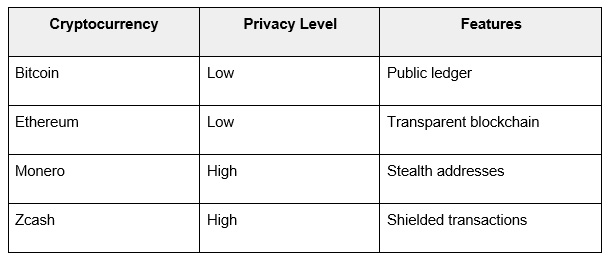Cryptocurrency casinos have gained attention due to their promise of anonymity. Many players are drawn to the idea of betting without leaving a digital footprint. However, the concept of complete anonymity is far more nuanced than it initially seems.
Anonymous crypto casino often operates under the notion of pseudonymity, meaning that while users’ names are hidden, their transactions are still recorded on public blockchains.
This raises questions about the true extent of privacy, as these records are accessible to anyone with the necessary knowledge and tools to trace them. The involvement of regulatory requirements, such as KYC checks, further complicates matters for those seeking true invisibility.
Understanding the Limits of Anonymity
Many cryptocurrency casinos advertise as fully anonymous. When using Bitcoin, Ethereum, or other cryptocurrencies, players may think that they are untraceable. But true anonymity and privacy are different matters.
When gambling at crypto casinos, users typically operate under pseudonyms rather than their real names. This creates an initial layer of privacy, as financial transactions are not linked to identifiable information. However, crypto transactions are still recorded on public blockchains, meaning that anyone with enough technical knowledge can trace these transactions.

This transparency ensures fair play and prevents fraudulent behaviour, but it also means that transactions are visible to those who know where to look. Although personal names are not attached to these transactions, identifying a user is possible via the wallet used. Complete anonymity is a myth without considerable extra effort, involving high-level tools and strategies to obscure one’s presence further.
The Impact of KYC Requirements
Another major factor impacting anonymity at crypto casinos is Know Your Customer (KYC) regulations. Many crypto casinos are required to verify players’ identities before allowing them to gamble. KYC involves submitting personal documents, which makes it challenging to maintain full anonymity.
While most legitimate casinos use secure systems to process KYC documents, the fact that personal information is stored on servers poses a risk. Once KYC information is submitted, anonymity is effectively compromised. Data is often retained for security purposes despite the promise of privacy, undermining the initial promise of being truly anonymous.
Privacy Coins vs Popular Cryptocurrencies
Most crypto casinos accept popular cryptocurrencies such as Bitcoin, Ethereum, and Litecoin. While these are common, they are not optimal for users aiming for anonymity. Privacy coins such as Monero and Zcash offer better solutions for anonymous transactions.
Monero, for example, uses stealth addresses and ring signatures to ensure transactions are much harder to trace. Zcash allows various privacy levels for its users, offering a greater degree of safety compared to standard cryptocurrencies. Choosing the right type of currency plays a significant role in enhancing one’s privacy while gambling.

How KYC Affects Crypto Anonymity
Know Your Customer (KYC) is a necessary regulatory measure aimed at preventing illegal activities like money laundering. Unfortunately, it is also a major barrier to maintaining anonymity when gambling with crypto. KYC requires users to submit identity documents and undergo verification, ensuring that the casino knows exactly who is behind the pseudonym.
Once KYC procedures are completed, the promise of anonymity is greatly diminished. Although the verification data is kept secure, any breach would expose a user’s identity. For those prioritising anonymity, this process is problematic, even though it serves the legitimate purpose of keeping gambling environments safe from bad actors.
Risks Involved in Crypto Gambling
Crypto casinos offer many benefits, but there are also inherent risks. Understanding these risks is crucial for anyone looking to gamble anonymously.

Hacking and Data Breaches
Cryptocurrencies and the platforms that use them are still relatively new, and vulnerabilities exist. Crypto casinos can fall victim to hacking attacks. For instance, a recent high-profile attack on a well-known crypto casino resulted in the theft of £41 million. Not only were funds stolen, but users’ data was also compromised. Such incidents highlight that even reputable casinos are not immune to cyberattacks.
Regulatory Uncertainty
The legal status of cryptocurrencies and online gambling varies significantly across jurisdictions. Some countries regulate these activities heavily, while others leave them largely unregulated. The lack of a standard regulatory framework means that legal protection can be inconsistent, making it difficult for players to protect themselves.
Volatility and Scams
Cryptocurrencies are known for their volatility. The value of digital currencies can fluctuate drastically in short periods, impacting winnings or deposits. Additionally, the relative anonymity of crypto can be exploited by fraudulent casinos that operate without licenses. Players must exercise caution and only use trusted platforms to avoid potential scams.
Enhancing Privacy While Gambling Online
While true anonymity may be challenging to achieve, there are ways to increase privacy when gambling at crypto casinos.
Use of Privacy Coins
Switching from common cryptocurrencies to privacy-focused coins is an effective first step. Monero and Zcash are popular options that provide advanced privacy features. These coins make it much harder for transactions to be traced, providing a greater sense of security.
Choosing Reputable Casinos
Selecting the right casino is key to protecting privacy. Reputable casinos with strong security measures, licensing, and privacy policies offer more protection for users. Look for casinos that commit to deleting KYC data after verification or those that use high-end security tools to protect sensitive information.
Utilising VPNs for Additional Security
Virtual Private Networks (VPNs) can mask a player’s location and enhance privacy. However, many casinos prohibit VPN use, as these tools are sometimes used for dishonest purposes. If attempting this approach, it is crucial to use a reputable VPN, as a poor-quality VPN might do more harm than good. VPNs are not a foolproof method for achieving anonymity, but they do add an extra layer of security.

Tips for Safer Crypto Gambling
To maximise privacy and minimise risks while gambling with cryptocurrencies, players should follow several best practices:
- Choose Licensed Casinos: Only gamble at reputable, licensed casinos. These platforms are more likely to take privacy seriously and offer robust protections.
- Use Privacy Coins: Opt for cryptocurrencies that prioritise privacy, such as Monero or Zcash.
- Set Up Secure Wallets: Use hardware wallets or secure digital wallets with two-factor authentication for storing cryptocurrency.
- Avoid Sharing Personal Information: Minimise the amount of personal data shared online, and use pseudonyms whenever possible.
- Check Reviews: Read reviews and conduct due diligence before selecting a casino. This will help identify safe platforms and avoid scams.
FAQ
Are crypto casinos truly anonymous?
Crypto casinos offer a level of anonymity, but complete invisibility is not guaranteed. Transactions are recorded on public blockchains, and KYC requirements often mean that personal information is needed.
How do KYC regulations affect anonymity?
KYC regulations require players to submit identity documents, which compromises anonymity. Even if transactions are made using cryptocurrencies, KYC processes link them to personal identities.
Which cryptocurrencies offer the most privacy?
Privacy-focused cryptocurrencies like Monero and Zcash provide the highest level of anonymity. They use advanced privacy features to make tracing transactions much more difficult compared to Bitcoin or Ethereum.
Can I use a VPN to stay anonymous at crypto casinos?
VPNs can help mask your location, but many casinos prohibit their use. A reputable VPN can add an extra layer of security, but it is not a guarantee of complete anonymity.
What are the risks of using crypto casinos?
The risks include hacking and data breaches, regulatory uncertainty, volatility of cryptocurrency values, and the potential for scams. Players should exercise caution and choose reputable platforms.
How can I enhance my privacy when gambling at crypto casinos?
To enhance privacy, use privacy-focused coins like Monero, choose reputable and licensed casinos, and consider using secure wallets and VPNs. These steps can help protect your identity and financial information.




